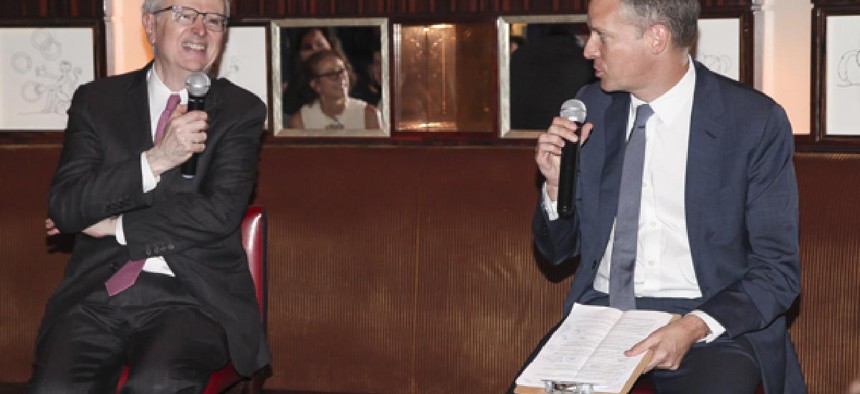Nonprofits help shift Mayor de Blasio’s opinion on closing Rikers, commission leaders say

New York City Mayor Bill de Blasio’s opinion about whether to shut down the Rikers Island jail complex has shifted significantly in less than a year – thanks in part to the efforts of nonprofits serving on the Independent Commission on New York City Criminal Justice and Incarceration Reform, and the persistence of its chairman, former state Court of Appeals Chief Judge Jonathan Lippman.
Lippman characterized the mayor’s original position on closing Rikers as being “equivocal” at best in late 2016 when he was asked by New York City Council Speaker Melissa Mark-Viverito to chair the commission – and at first thought it an “unenviable request.”
“There was no great public clamor to close Rikers Island,” Lippman said about the jail complex, which houses primarily low-income people of color who are unable to pay bail as they await their trial date. The attitude was more along the lines of “out of sight, out of mind,” Lippman said. He eventually signed on because the opportunity to make a mark on such a significant challenge was difficult to resist.
Now the debate surrounding the issue is focused on how fast the jail can be shut down, Lippman said while being interviewed by Greg Berman, director of the Center for Court Innovation, during The New York Women’s Foundation’s 2017 Le Cirque Luncheon hosted by philanthropist Jean Shafiroff.
“I think he (de Blasio) came to the view that it was morally right. And beyond that, that you could be morally right and politically wise at the same time,” Lippman said. “Crime is an emotional issue. ... My belief is you can do both, that you can do the right thing, which this is – the humane thing – and yet also be doing something that’s smart for you politically.”
The commission consists of 27 leaders including Darren Walker, president of the Ford Foundation; Glenn Martin, founder and president of JustLeadershipUSA; Ana Oliveira, president and CEO of The New York Women’s Foundation; and Nicholas Turner, president and director of the Vera Institute for Justice.
“My theory, in a broader sense, was to have the commission be representative of a cross section of the city, particularly people who had an interest in criminal justice, and at the same time, give voices to people who had never really been heard,” Lippman said.
He said he made weekly calls and frequent appearances to de Blasio’s office advocating for closing Rikers Island. In April, the commission released its report recommending that the jail complex be shut down and replaced with smaller jails in each borough, closer to the courthouses they serve. On the Friday before the commission released its report, de Blasio announced plans to shut down Rikers Island within a decade. And in June, the mayor released a blueprint for closing Rikers.
“Nonprofit service providers were critical players in getting the mayor to support closing the Rikers Island jail facilities,” Lippman told New York Nonprofit Media in a statement. “Our broad coalition included nonprofit service providers across the spectrum of New York City life, which gave great gravitas to our cause.”
The commission focused on the plight of three particular populations that Lippman said often don’t belong in Rikers at all: children (16- and 17-year-olds who were processed as adults prior to Gov. Andrew Cuomo signing legislation this year raising the age of criminal responsibility to 18), the mentally ill and women. Even a short stay at Rikers can be significantly disruptive – leading to evictions, loss of employment and children being removed from their caregivers. Lippman invited Oliveira to the commission to talk about the concerns of incarcerated women.
“The direct service providers and advocates, both on and off the commission, were critical in terms of creating a cultural shift and the alignment of political willpower when it came to the issue of closing Rikers,” Oliveira said.
“This commission would not have been as successful without their voice and participation,” she told NYN Media in a statement.
The annual NYWF luncheon, held on Sept. 18, served as a prelude for the organization’s fall gala. Lippman said the work of the commission is now focused on raising money, helping to identify locations for borough jails and holding stakeholders and elected officials accountable for what they promised to do.
NEXT STORY: NYN Media Buzz: Oct. 3, 2017